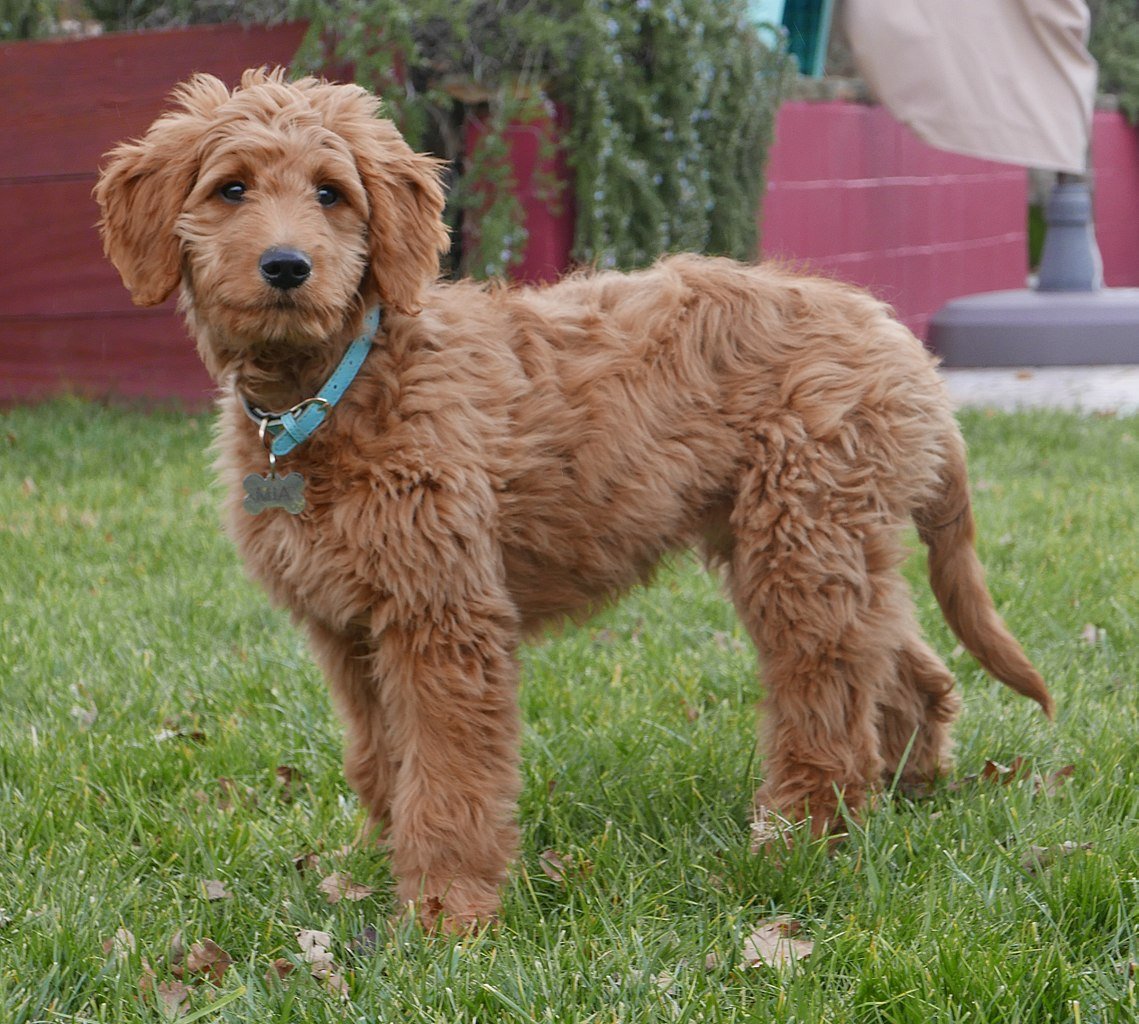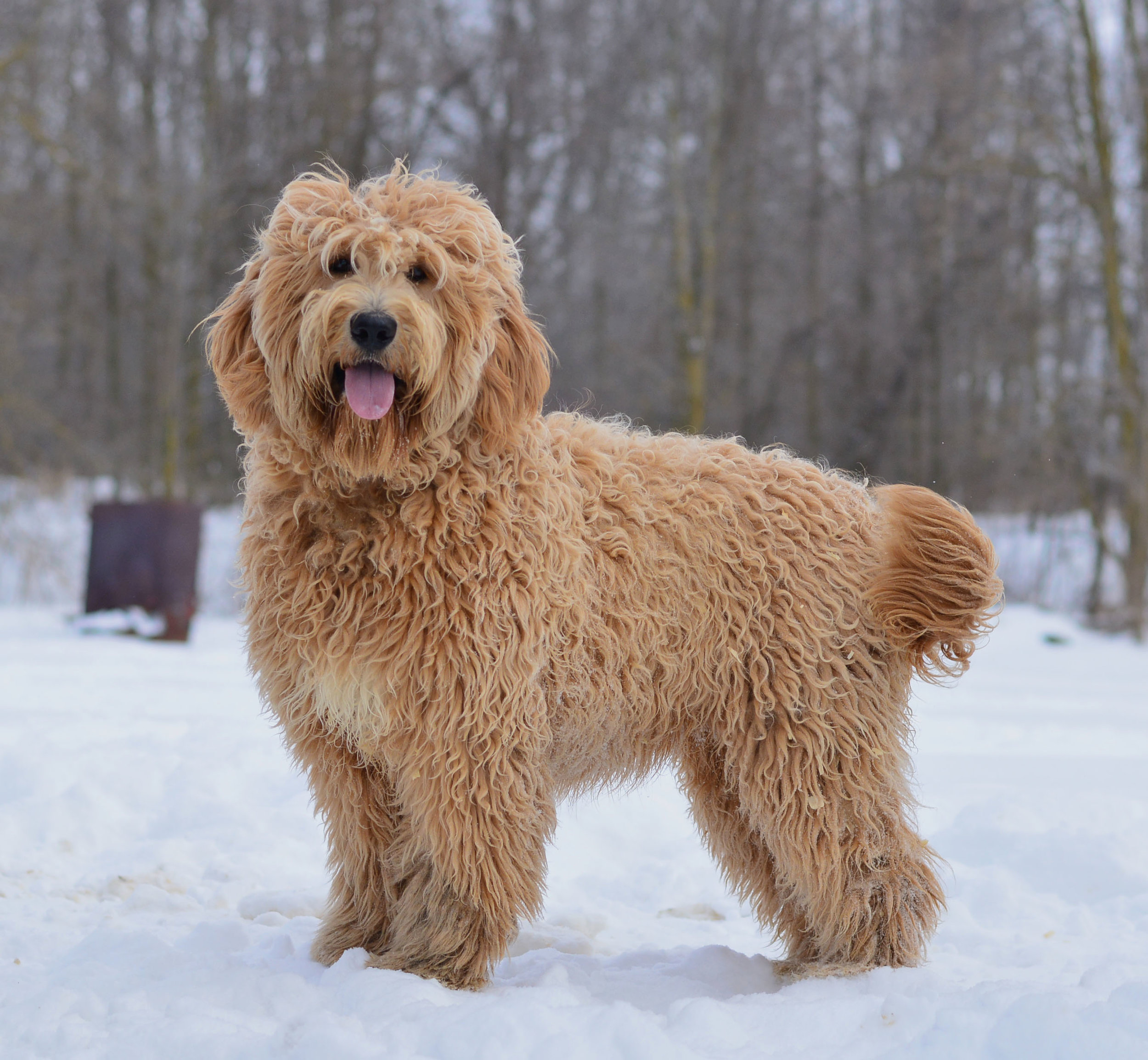Could the Goldendoodle be the perfect canine companion you've been searching for? This hybrid breed, a cross between the beloved Golden Retriever and the intelligent Poodle, often embodies the best qualities of both parent breeds, making it a popular choice for families and individuals alike.
The Goldendoodle, a relative newcomer in the world of dog breeds, has rapidly gained a dedicated following. These dogs are celebrated for their friendly and affectionate personalities, their intelligence, and the potential for a low-shedding coat, which makes them an attractive option for those with allergies. The story of the Goldendoodle is one of intentional design, blending the traits of two well-loved breeds to create a dog that is both a companion and a family member. While not recognized by traditional purebred organizations, the Goldendoodle's popularity has skyrocketed, cementing its place as one of the most sought-after "designer dogs" on the market. The journey of this hybrid from its origins in the 1990s to its current status is a testament to its appeal and adaptability.
| Characteristic | Details |
|---|---|
| Origin | United States (1990s) |
| Parent Breeds | Golden Retriever and Poodle |
| Purpose | Companion, Assistance dog |
| Size | Varies greatly (Mini, Medium, Standard) |
| Coat Types | Wavy, curly, straight |
| Shedding | Low to Non-Shedding |
| Temperament | Friendly, intelligent, playful, affectionate |
| Lifespan | 10-15 years |
| Common Health Issues | Hip dysplasia, progressive retinal atrophy, allergies, etc. |
For more information, visit Goldendoodle Association of North America
- Steven Williams Net Worth An Indepth Look At His Wealth And Achievements
- Exploring The Net Worth Of Ken Shamrock A Deep Dive Into The Life And Career Of The Worlds Most Dangerous Man
The Golden Retriever, the other key ingredient in the Goldendoodle recipe, boasts a history rooted in British aristocracy. Bred initially by Lord Tweedmouth, the Golden Retriever was developed in the late 19th century. Lord Tweedmouth, captivated by the yellow color of retrievers, sought to create a dog that excelled in retrieving, particularly in the challenging terrains of hunts. The breed's name, initially "Golden Flat Coats," evolved over time to reflect its increasing popularity and distinctive golden hue. The Golden Retriever's inherent friendly nature and trainability have made it a beloved family pet, traits that are often passed on to its Goldendoodle offspring.
Goldendoodles, as a result of their mixed heritage, exhibit a wide range of appearances. The size of a Goldendoodle can vary significantly, depending on the size of the Poodle parent. Goldendoodles come in three primary size categories: miniature, medium, and standard. Mini Goldendoodles are often the result of breeding a Golden Retriever with a miniature or toy Poodle, while standard Goldendoodles result from breeding with a standard Poodle. The resulting size of the Goldendoodle can vary from as small as 15 pounds to as large as 90 pounds or more. This variability means there's a Goldendoodle size that suits almost any living situation. Similarly, coat types also range broadly, from the loose, wavy coat of a first-generation Goldendoodle (F1 Golden Retriever x Poodle) to the tighter curls often seen in Goldendoodles with more Poodle influence (F1B Goldendoodle x Poodle). The coat colors also vary widely, ranging from classic gold to cream, black, brown, and even parti-colored combinations.
The Goldendoodle's temperament is one of its most endearing qualities. Generally speaking, Goldendoodles are known for being friendly, affectionate, and eager to please. They are typically highly intelligent, inheriting the Poodle's brainpower, and they are also often very trainable. Their playful and social nature makes them excellent companions for families, including those with children. They generally get along well with other pets, though early socialization is important to ensure they grow into well-adjusted dogs. This combination of traits makes Goldendoodles well-suited to a variety of lifestyles, from active families to individuals seeking a calm and loving friend. The Goldendoodle's temperament, however, can be influenced by several factors, including its breeding, early socialization, and training.
- Fixer To Fabulous Net Worth Exploring The Success Of Hgtvs Beloved Duo
- Hannah Burcaw Net Worth Exploring Her Inspiring Story And Financial Success
One of the primary reasons for the Goldendoodle's popularity is the potential for a hypoallergenic coat. This trait is largely inherited from the Poodle parent, whose coats shed minimally. While no dog breed is truly "hypoallergenic," Goldendoodles often produce less dander than many other breeds, making them a good option for allergy sufferers. However, the degree of shedding varies depending on the Goldendoodle's coat type and the generation of the cross. For example, an F1B Goldendoodle (Goldendoodle x Poodle) is often considered more hypoallergenic than an F1 Goldendoodle (Golden Retriever x Poodle) because it inherits more of the Poodle's non-shedding qualities. Regular grooming, including brushing and professional grooming, is necessary to maintain the Goldendoodle's coat and minimize shedding.
Caring for a Goldendoodle requires attention to several key areas, including grooming, diet, exercise, and healthcare. The coat needs regular brushing, typically several times a week, to prevent mats and tangles. Professional grooming every few months is often recommended to keep the coat in good condition. Diet should be carefully monitored, and Goldendoodles should be fed a high-quality dog food appropriate for their age, size, and activity level. Portion control is essential to prevent weight gain, as Goldendoodles can be prone to overeating. Regular exercise is important to keep them physically and mentally stimulated, which can include walks, runs, playtime, and interactive games. Routine veterinary checkups, vaccinations, and preventative care are critical to maintaining their overall health.
Like all breeds, Goldendoodles are susceptible to certain health problems. Responsible breeders conduct health screenings to minimize the risk of passing on genetic diseases. Common health concerns include hip dysplasia, elbow dysplasia, progressive retinal atrophy (PRA), and certain heart conditions. Allergies, both environmental and food-related, are also common in Goldendoodles. Choosing a reputable breeder is crucial, as they will be transparent about health testing and will provide documentation. Regular veterinary checkups and a proactive approach to preventative care can help detect and manage potential health issues early on. Furthermore, owners should be vigilant about any signs of illness or discomfort and consult with their veterinarian as needed.
Training a Goldendoodle is generally a rewarding experience due to their intelligence and eagerness to please. Positive reinforcement techniques, such as rewards, praise, and games, are highly effective. Consistency is key to successful training. Early socialization is also very important, exposing the Goldendoodle to different environments, people, and animals from a young age to help them become well-adjusted, confident dogs. Goldendoodles excel in various dog sports and activities, including agility, obedience, and therapy work. The training approach should be tailored to the individual dog's personality and learning style.
Finding a Goldendoodle can be done through several avenues. Reputable breeders are the best option for ensuring a healthy and well-bred puppy. Prospective owners should research breeders thoroughly, visit the breeding facility if possible, and ask about health testing and the parents' temperaments. Rescue organizations and shelters also occasionally have Goldendoodles available for adoption. Adopting a Goldendoodle is a wonderful way to give a deserving dog a loving home. Online platforms can connect potential owners with breeders and rescue organizations, but it's crucial to do due diligence and avoid puppy mills or unethical breeders. Prices for Goldendoodles vary, depending on factors like the breeder's reputation, location, and the dog's lineage. Be prepared to pay a reasonable price for a well-bred Goldendoodle and be wary of prices that seem too good to be true.
The Goldendoodle's popularity extends worldwide, with variations in breeding practices and preferences in different regions. In the United Kingdom, the Goldendoodle has become increasingly popular, mirroring the trend in the United States and other countries. Breeders in the UK often emphasize health testing and ethical breeding practices, ensuring that their puppies are healthy and well-socialized. Similarly, in Australia, the Goldendoodle has gained a strong following, with Australian breeders focusing on producing dogs with excellent temperaments and healthy genetics. The demand for Goldendoodles in Australia has led to the establishment of various breeding programs and the growth of online communities dedicated to the breed. In Germany, the "Doodle" trend, which includes Goldendoodles, is also experiencing a surge in popularity. This increased interest has led to specialized breeding practices and a growing community of Goldendoodle owners. While the breed is popular globally, standards and practices vary, underscoring the importance of choosing a reputable breeder no matter where you are.
Miniature Australian Goldendoodles are created by crossing a mini Goldendoodle with a mini Australian Labradoodle. The term "English Goldendoodle" typically refers to the cross between an English Cream Golden Retriever and a Poodle. English Cream Golden Retrievers are often sought after for their lighter coat color. "Teddy bear Goldendoodle" is another descriptor, often used to describe Goldendoodles that have a rounder face and a particularly fluffy appearance. These variations demonstrate the continued evolution and refinement of the breed, driven by breeders and owners who are aiming for specific aesthetic traits and temperamental qualities.
Some owners and breeders use the nicknames such as "golden poos," "goldie poos," or "groodles." The Goldendoodle is not recognized by traditional purebred organizations. It is categorized as a "designer dog," that is, a crossbreed intentionally created to combine the best traits of two or more recognized breeds. This distinction is crucial for understanding the Goldendoodle's place in the canine world, as its standards are less defined than those of purebred dogs. There are variations and different generations of Goldendoodles such as F1, F1B. F1 is a first-generation cross between a Golden Retriever and a Poodle, while F1B is a first-generation Goldendoodle bred with a Poodle. This variation in breeding affects the Goldendoodle's traits, including its shedding level and coat type.
The increasing popularity of Goldendoodles has also led to the emergence of specialized breeders and online communities. Breeders like Moss Creek, mentioned in some of the provided text, focus on breeding Goldendoodles and finding loving homes for their puppies. These breeders often have detailed adoption processes and require applications from prospective owners. Additionally, the Goldendoodle Association of North America promotes healthy, thriving Goldendoodles through ethical breeding, health standards, and education, playing an essential role in the breed's welfare and reputation.
The Goldendoodle has its roots in the 1990s, a time when the concept of "designer dogs" was gaining traction. The aim was to combine the desirable qualities of two well-established breeds to create a new type of companion animal. The first Goldendoodles were created by crossing the Golden Retriever and the Poodle. These early crosses were intended to blend the Golden Retriever's amiable nature with the Poodle's low-shedding coat, giving rise to a dog that was both friendly and relatively allergy-friendly. This hybrid created a new niche in the pet market, which met the needs of owners with allergies and those seeking a family-friendly pet.
Goldendoodles' suitability for sports and families is a factor driving their popularity. They often do well in dog sports due to their intelligence and athleticism, and their temperament makes them great family pets. The adaptability and good nature of Goldendoodles, coupled with their low-shedding potential, make them a good choice for both active individuals and families. The breed is known for being good with children, getting along with other pets, and fitting in well in various living environments. Their easygoing nature and trainability makes them a popular option.
The care of a Goldendoodle entails daily considerations, like a diet appropriate to its nutritional and energetic needs. It is crucial not to overfeed them, because, if you let them, they will continue to eat even when they are full, they are very gluttonous, which can easily lead to overweight and obesity. A balanced diet, portion control, regular exercise, and proper grooming are essential elements of caring for this breed.
Choosing a Goldendoodle requires careful thought and planning. Potential owners need to consider their lifestyle, living situation, and allergy concerns. Researching the breed thoroughly and finding a responsible breeder is crucial to acquiring a healthy and well-adjusted Goldendoodle. This designer breed's popularity has led to both excitement and concern, highlighting the significance of responsible breeding and adoption practices. Whether as a companion for an individual or as a member of a family, the Goldendoodle offers the potential for a fulfilling and loving relationship. The ongoing evolution of Goldendoodles, along with the continuous dedication of breeders and owners, makes them a beloved breed for years to come.



Detail Author:
- Name : Rachael Dietrich
- Username : hrau
- Email : kevin.berge@pfannerstill.com
- Birthdate : 1972-09-09
- Address : 5482 Krystel Center Port Kevenbury, GA 80168
- Phone : (864) 835-8931
- Company : Mitchell Inc
- Job : Rigger
- Bio : Officiis aliquam eos odit id maiores voluptatum eveniet. Non assumenda amet autem esse voluptatibus. Blanditiis qui molestiae libero voluptatem hic est atque.
Socials
linkedin:
- url : https://linkedin.com/in/aimeeking
- username : aimeeking
- bio : Itaque voluptatem aut ut natus.
- followers : 2456
- following : 162
instagram:
- url : https://instagram.com/king1992
- username : king1992
- bio : Non esse totam est harum. Quo ea tempore aut. Et velit odit incidunt voluptates.
- followers : 787
- following : 1750
facebook:
- url : https://facebook.com/aimeeking
- username : aimeeking
- bio : Rem corporis accusamus aut omnis enim iusto aut.
- followers : 2801
- following : 1005
tiktok:
- url : https://tiktok.com/@king1982
- username : king1982
- bio : Officia iure mollitia eaque et.
- followers : 421
- following : 2076
twitter:
- url : https://twitter.com/aimee_king
- username : aimee_king
- bio : Nam omnis ut et ut voluptatem. Officiis amet omnis quo. Eius laudantium expedita exercitationem est.
- followers : 6355
- following : 2258